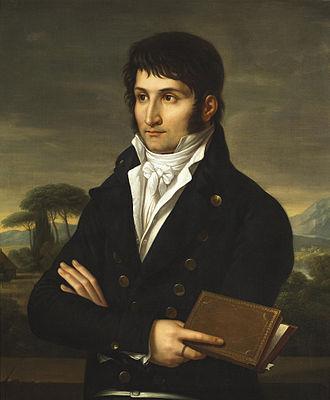Hello everyone, I am Captain Nemo, welcome aboard the Nautilus, Captain Nemo takes you on a journey through the oceans of knowledge.
In 1804 Napoleon became emperor, his brother Joseph Bonaparte became King of Spain, his third brother Louis Bonaparte became King of the Netherlands, and his younger brother Jérôme Bonaparte became King of Westphalia, except for his second brother Lucian Bonaparte. Why did Lucien Bonaparte, as Napoleon's brother, not become king, the captain told you.
First, born into the nobility

Lucien Bonaparte
Lucien Bonaparte was born on 21 May 1775 in Corsica, in the Kingdom of France, the son of Carlo Maria di Boonaba and Maria Leticia La Molino. From an early age, Lucien Bonaparte, like his brothers Joseph Bonaparte and Napoleon Bonaparte, traveled to mainland France to study, received military and theological education, and was interested in history.
Second, participate in the revolution
French Revolution
When the French Revolution broke out in 1789, Lucien Bonaparte, who was only 14 years old, resolutely returned to Corsica to join the revolutionary movement in his hometown. The young Lucien Bonaparte was passionate and eager for revolution, so he joined the local Jacobin Club and became a propagandist, a pole of revolutionary ideas. Lucien Bonaparte was the most influenced member of Bonaparte's family with revolutionary ideas, and his subsequent break with Napoleon laid the foundation for the distant cause.
When King Louis XVI of France was executed by the Jacobins in 1793, Lucien Bonaparte chose to support Maximilian François Mari Isido de Robespierre and other policies, and renamed himself "Brutus" (Caesar's adopted son, who participated in the assassination of Caesar) and became a radical revolutionary. Pasquale Pauli (a Corsican revolutionary who opposed French rule in Corsica) thought the revolution was a bit excessive and objected to it.
Pasquale Pauli
Lucien Bonaparte, as Pasquale Pauli's secretary, broke with him, only to be attacked by a mob and flee with his family to mainland France. In 1794, the Thermidorian Coup d'état occurred in France, the Jacobins fell, and Robespierre was executed. Lucien Bonaparte was arrested because he was a staunch supporter of Robespierre, but thanks to his brother Napoleon's rescue, he escaped. Lucien Bonaparte then chose to join the army and fight with Napoleon.
Third, participate in the political arena
Napoleon
Soon the Political Situation in France stabilized, and Lucien Bonaparte immediately left the army and settled in Paris, choosing to continue to participate in politics. At that time, Napoleon performed well in the battle against the anti-French coalition forces, and became famous and prestigious in France. But Lucien Bonaparte did not want to touch the light of his brother Napoleon, so with the help of Jacobins and Corsican connections, he rose rapidly and was elected to the Five Hundred House of Representatives, becoming a rising star in French politics.
In October 1799, Lucien Bonaparte was elected President of the Five Hundred. In November, Napoleon staged a coup d'état in the Misty Moon, and he chose to help his brother and demanded that the parliament be dissolved. Napoleon then became the first consul of France and appointed Lucien Bonaparte as Minister of the Interior. Soon Lucien Bonaparte clashed with the Minister of Police, Joseph Fouché, over duplication of powers. However, Joseph Fouché cleverly took advantage of his conflict with Napoleon and his shortcomings in management, gained Napoleon's trust and support, and expelled him from the cabinet.
The situation in Europe
In 1800, Napoleon transferred Lucien Bonaparte as French ambassador to Spain. He then used French influence to gain the support of the Spanish crown, mediate the Spanish-Portuguese conflict, and expel British forces from Spain. Lucien Bonaparte thus regained Napoleon's favor and returned to France in 1801 to serve on the Bills Review Committee.
Fourth, brotherly discord
Alexander de Blaisand
In 1794, Lucien Bonaparte married Christine Boyer and had four children. But Christine Boyer died in childbirth in 1800, and in 1803 he remarried the widow Alexander de Blechamp. At that time, Napoleon was ready to become emperor and wanted the family members to marry the European royal family, so he was very dissatisfied with Lucien Bonaparte's marriage, and forced him to go to Rome to find Pope Pius VII and declare the marriage between the two.
The French Empire
Lucien Bonaparte became acquainted and became friends with Pius VII, not only failing to mention his divorce from Alexandre de Blechampan, but also accusing Napoleon of marrying Josephine de Boarne, who was also a widow, which worsened relations between Lucien Bonaparte and Napoleon and led to a rupture. When Napoleon became emperor in 1804, Lucien Bonaparte fled France and chose to settle in Italy, refusing all the honors and privileges of the French royal family.
Pius VII
In 1809, Napoleon arrested Pius VII and annexed the Papal State. Lucien Bonaparte then fled to the United States, but was detained by the British on the way and was not released until 1814, when he was made Prince of Canino and Musignano by Pius VII. When Napoleon made a comeback in 1815, he returned to France to reconcile with his brother. Soon Napoleon was defeated at the Battle of Waterloo and fled to Rome until his death in 1840.
In general, Lucien Bonaparte was deeply influenced by the French Revolution, refusing to rely on the power of his brother Napoleon to help him ascend to the throne, and refusing to allow him to choose to flee France and seek the protection of Pope Pius VII in the marriage he arranged for himself. Lucien Bonaparte refused the status and honor of being a member of the French royal family and refused to marry a European princess, which prevented him from being made king by Napoleon.